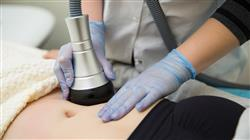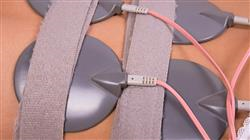University certificate
The world's largest faculty of medicine”
Introduction to the Program
Focused on practice, this Postgraduate diploma will allow you to work with the most appropriate techniques in each case in an effective and safe manner"

The field of application of electrotherapy is very wide, so it is necessary to have an extensive knowledge of both the physiological functioning of the subject and the most appropriate agent in each case.
This knowledge ranges from muscle contraction mechanisms to somatosensory transmission mechanisms, which makes it essential for the rehabilitation physician to know both the pathophysiological mechanisms of the subject and the physicochemical basis of electrotherapy.
The objective of the program is to present in an updated way the applications of electrotherapy in neuromusculoskeletal or neurological pathologies, always based on scientific evidence when selecting the most appropriate type of current in each case.
To this end, the neurophysiological bases of each type of current are always presented at the beginning of each module, so that learning is complete. Each module is complemented by practical applications of each type of current, so that the integration of the knowledge of the pathology and its treatment is complete.
The most comprehensive development in the neurophysiological bases that justify the operation of electrotherapy with an approach tailored to individual practice"
The Postgraduate diploma in Electrotherapy in Individual Practice contains the most complete and up to date scientific program on the market. The most important features of the program include:
- More than 75 practical cases presented by experts in electrotherapy
- The graphic, schematic, and eminently practical contents with which they are created provide scientific and practical information on the disciplines that are essential for professional
- New developments on the role of the rehabilitation physician in the application of electrotherapy
- Practical exercises where self-assessment can be used to improve learning
- Algorithm based interactive learning system for decision making in the situations that are presented to the student
- Its special emphasis on research methodologies on electrotherapy applied to Rehabilitation Medicine
- Theoretical lessons, questions to the expert, debate forums on controversial topics, and individual reflection assignments
- Content that is accessible from any fixed or portable device with an Internet connection
This complete Postgraduate diploma will allow you to learn about simulated environments and cases, providing you with an integrated, more efficient vision of real situations"
The teaching staff includes professionals from the field of medicine, who bring their experience to this training program, as well as renowned specialists from leading societies and prestigious universities.
The multimedia content, developed with the latest educational technology, will provide the professional with situated and contextual learning, i.e., a simulated environment that will provide immersive training programmed to train in real situations.
This program is designed around Problem Based Learning, whereby the professional must try to solve the different professional practice situations that arise during the academic year. For this, the professional will have the help of an innovative interactive video system made by recognized experts in Electrotherapy in Rehabilitation Medicine, with great experience. 
Learn to plan and develop the individual practice of electrotherapy applying the latest approaches and innovations in this field"
Why study at TECH?
TECH is the world’s largest online university. With an impressive catalog of more than 14,000 university programs available in 11 languages, it is positioned as a leader in employability, with a 99% job placement rate. In addition, it relies on an enormous faculty of more than 6,000 professors of the highest international renown.

Study at the world's largest online university and guarantee your professional success. The future starts at TECH”
The world’s best online university according to FORBES
The prestigious Forbes magazine, specialized in business and finance, has highlighted TECH as “the world's best online university” This is what they have recently stated in an article in their digital edition in which they echo the success story of this institution, “thanks to the academic offer it provides, the selection of its teaching staff, and an innovative learning method aimed at educating the professionals of the future”
A revolutionary study method, a cutting-edge faculty and a practical focus: the key to TECH's success.
The most complete study plans on the university scene
TECH offers the most complete study plans on the university scene, with syllabuses that cover fundamental concepts and, at the same time, the main scientific advances in their specific scientific areas. In addition, these programs are continuously being updated to guarantee students the academic vanguard and the most in-demand professional skills. In this way, the university's qualifications provide its graduates with a significant advantage to propel their careers to success.
TECH offers the most comprehensive and intensive study plans on the current university scene.
A world-class teaching staff
TECH's teaching staff is made up of more than 6,000 professors with the highest international recognition. Professors, researchers and top executives of multinational companies, including Isaiah Covington, performance coach of the Boston Celtics; Magda Romanska, principal investigator at Harvard MetaLAB; Ignacio Wistumba, chairman of the department of translational molecular pathology at MD Anderson Cancer Center; and D.W. Pine, creative director of TIME magazine, among others.
Internationally renowned experts, specialized in different branches of Health, Technology, Communication and Business, form part of the TECH faculty.
A unique learning method
TECH is the first university to use Relearning in all its programs. It is the best online learning methodology, accredited with international teaching quality certifications, provided by prestigious educational agencies. In addition, this disruptive educational model is complemented with the “Case Method”, thereby setting up a unique online teaching strategy. Innovative teaching resources are also implemented, including detailed videos, infographics and interactive summaries.
TECH combines Relearning and the Case Method in all its university programs to guarantee excellent theoretical and practical learning, studying whenever and wherever you want.
The world's largest online university
TECH is the world’s largest online university. We are the largest educational institution, with the best and widest online educational catalog, one hundred percent online and covering the vast majority of areas of knowledge. We offer a large selection of our own degrees and accredited online undergraduate and postgraduate degrees. In total, more than 14,000 university degrees, in eleven different languages, make us the largest educational largest in the world.
TECH has the world's most extensive catalog of academic and official programs, available in more than 11 languages.
Google Premier Partner
The American technology giant has awarded TECH the Google Google Premier Partner badge. This award, which is only available to 3% of the world's companies, highlights the efficient, flexible and tailored experience that this university provides to students. The recognition as a Google Premier Partner not only accredits the maximum rigor, performance and investment in TECH's digital infrastructures, but also places this university as one of the world's leading technology companies.
Google has positioned TECH in the top 3% of the world's most important technology companies by awarding it its Google Premier Partner badge.
The official online university of the NBA
TECH is the official online university of the NBA. Thanks to our agreement with the biggest league in basketball, we offer our students exclusive university programs, as well as a wide variety of educational resources focused on the business of the league and other areas of the sports industry. Each program is made up of a uniquely designed syllabus and features exceptional guest hosts: professionals with a distinguished sports background who will offer their expertise on the most relevant topics.
TECH has been selected by the NBA, the world's top basketball league, as its official online university.
The top-rated university by its students
Students have positioned TECH as the world's top-rated university on the main review websites, with a highest rating of 4.9 out of 5, obtained from more than 1,000 reviews. These results consolidate TECH as the benchmark university institution at an international level, reflecting the excellence and positive impact of its educational model.” reflecting the excellence and positive impact of its educational model.”
TECH is the world’s top-rated university by its students.
Leaders in employability
TECH has managed to become the leading university in employability. 99% of its students obtain jobs in the academic field they have studied, within one year of completing any of the university's programs. A similar number achieve immediate career enhancement. All this thanks to a study methodology that bases its effectiveness on the acquisition of practical skills, which are absolutely necessary for professional development.
99% of TECH graduates find a job within a year of completing their studies.
Postgraduate Diploma in Electrotherapy in Individual Practice.
In individual practice, electrotherapy is a therapeutic technique that uses electrical currents to relieve symptoms of pain, inflammation and other physical problems. This technique is used in physical therapy and sports health, among other areas of health care. Electrotherapy is based on the use of different forms of electrical current to produce different therapeutic effects. For example, galvanic currents are used to reduce pain and inflammation in soft tissue, while interferential currents are used to stimulate the nervous system and improve muscle recovery.
In individual practice, electrotherapy is used to treat injuries, such as muscle injuries, fractures, muscle spasms and inflammation. It can also be used to treat chronic pain disorders, such as arthritis. Electrotherapy is performed through the application of electrodes to the skin, which transmit electrical current to the affected area of the body. The intensity, duration and frequency of the electric current are adjusted according to the patient's needs and physical condition.
Electrotherapy in individual practice is a therapeutic technique that uses electrical currents to treat injuries and relieve symptoms of pain, inflammation and other physical problems. The treatment is adjusted according to the patient's needs and is carried out through the application of electrodes to the skin.
TECH, the world's largest digital university, has an academic program designed to provide students with knowledge and skills in the use of electrotherapy to treat musculoskeletal conditions and injuries in patients and athletes. Electrotherapy is used to treat many different conditions including muscle contractures, tendonitis, soft tissue injuries and chronic pain. Students will learn to apply the fundamentals of electrotherapy to individual clinical practice, including assessing patient suitability for electrotherapy treatment, selecting and applying specific electrotherapy modalities, and evaluating treatment outcomes.







